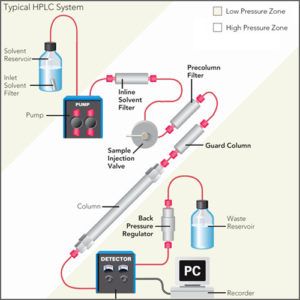The first post described the instrumentation well enough, so I will give a little more on the chemistry and application.
HPLC is one variation of a "two phase distribution system" consisting of three parts: analytes (the mixture that you want to separate), a stationary phase (some solid material with a known surface chemistry packed inside a metal "column"), and mobile phase (a liquid mixture that we push through the column, usually at relatively high pressure).
The mixture is introduced into the flowing mobile phase and enters the column where it now has a choice between staying in the liquid phase or stopping on the stationary surface (this is the two-phase distribution part). Individual molecules will prefer one phase or the other, depending which phase they are "like." This process happens continuously through the column, and if the molecules have different preferences for the stationary phase, they will all come out at different times, depending on how many times they stopped on the way through the column. If we push the mobile phase through at a constant rate, they will all come out at different times, and we can "detect" them as individual "peaks."
[If you don't have a strong chemistry background, you can think of this distribution process as like a mixture of gasoline and water, or oil and vinegar dressing. In each case, you see two different "layers" because the two parts are not "like" each other. The water (or vinegar) is a hydrophilic phase, and anything that is highly water soluble, like sugars, will go to that phase. The gasoline (or oil) is hydrophobic, and will attract things that are not water soluble, like fats. And, of course, there will be things that are fairly happy in both phases. HPLC is just like lining up a long series of these phases, and passing one of the phases from one bottle to the next, and the next, and so on. By the time you get to the end of the line, you may find that all the separate components in the mixture are now all spread out over different bottles.]
Applications of HPLC are quite diverse. Nearly every pharmaceutical compound, whether over-the-counter or prescription, has been tested for purity and to confirm the amount of drug that is present. The gasoline in your car has been tested to ensure that it has the right proportions of certain types of compounds in it. Want to know the vitamin content in your food? It is probably done by HPLC. This technique has been very successful in helping many industries make and sell better products. This success is due to advances in instruments as well as variation in the chemistry of the stationary phase.

